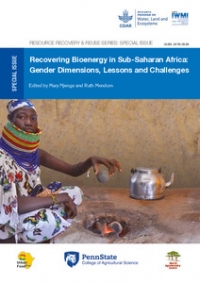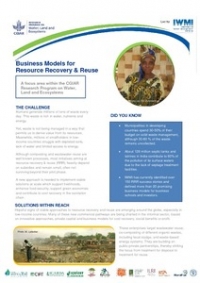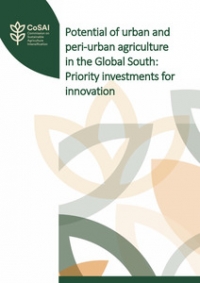As we mark World Toilet Day this week, the planet struggles with how to manage sanitation. New business models are helping turn septic tank sludge into safe fertilizer and energy. Young entrepreneurs are poised to make this take off!
-----
As agriculture changes, developing countries are grappling with how to provide meaningful employment and entrepreneurial opportunities to youth and others. More than 85% of the world’s 1.2 billion youth live in developing countries, and the once dominant agricultural sector is shrinking. This results in a lack of opportunities for youth, which can in turn lead to migration and political insecurity.
Now, entrepreneurship opportunities are arising from an unexpected source: Waste. Business models for turning waste into wealth are being adopted into curricula in 19 universities in Asia, Europe and Africa.
These models can benefit both our environment and our economy. For example, 'fecal sludge' from septic tanks can be safely turned into fertlizers or briquettes. This ensures the rich nutrients and energy in human waste don't go to waste. And it means entrepreneurs could capture some cash by desludging septic tanks, transporting and treating waste, and turning it into resource that can be sold to governments or farmers.
“The business of safe recovery of water, nutrients and energy from domestic and agro-industrial waste offers significant opportunities to generate economic and social benefits to women and unemployed youth, especially in developing countries,” said Dr. Josiane Nikiema who leads International Water Management Institute (IWMI)'s Circular Economy and Water Pollution work.
“These entrepreneurs, however, face high market entry barriers due to a lack of social networks, specialist skills and capital. It is therefore important to identify appropriate business training for youth or women entrepreneurs, tailored to their specific needs and capacity gaps under each unique geographical context.”
Population growth and urbanization are creating waste crises. Especially in developing countries, waste continues to pollute, affecting drinking water, dangerously overfilling landfills or septic tanks, or dirtying public spaces. Often the waste is burned, choking up local air and releasing carbon. Growing urban centers are keenly looking for waste management solutions.
At the same time, organic waste is rich in nutrients, water and energy that can be recovered to grow food and power economies. For savvy entrepreneurs, waste is packed with potential wealth, offering opportunities particularly for women.
Scientists working with IWMI and the CGIAR Research Program on Water, Land and Ecosystems (WLE) have released a major compendium of wealth-from-waste business models, all based on real-world examples. They include innovative models for converting human waste into safe fertilizer, food waste into biogas, and wastewater into irrigation sources. The models have the potential to create new forms of business and are being further developed in Ghana and Sri Lanka. The ideas have even been adopted into policy in Sri Lanka, which should spur more innovation.
Now, WLE and IWMI aim to bring these business models into school curricula. WLE is engaging with 19 universities to adapt this work into syllabi, giving young professionals opportunities to learn new marketable skills. An intensive training program was already held for 25 university teachers to deliver material to students. These ‘train-the-trainer’ programs help tailor material for engineering, health, economics or business courses, and they support peer training. And a free online course has just been recently launched, focusing on the entrepreneurial aspects of waste solutions.
With these recent developments, resource recovery and reuse business models look set to bring opportunities for youth, a more circular economy and a cleaner environment.



_0/index.jpg?itok=EVYUzld0&c=29319612956316f51f0befa5260c4c13)











